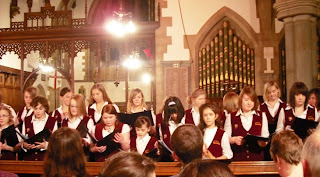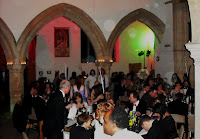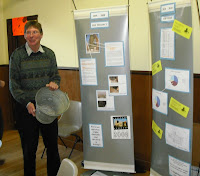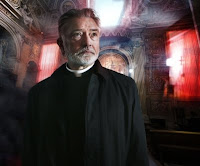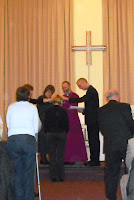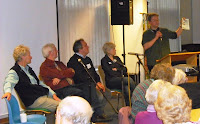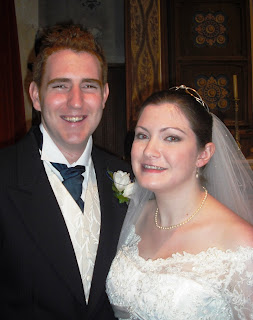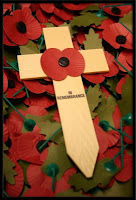This is a draft of a document the LSM group have been working on. I thought regular blog readers might like a look - and are more than welcome to comment...
Local Shared Ministry in Milton Keynes
What is Local Shared Ministry?
Local Shared Ministry (LSM) is an approach to ministry characterised by three main features:
Local: The emphasis is on the ministry of local Christians who are called, trained, authorised and supported to serve God in their local church and community.
Shared: Lay and ordained Christians share their calling, training, leadership and ministry within mutually supportive teams.
Enabled: Local teams and churches are supported, trained, guided and equipped by the wider church.
Local Shared Ministry (sometimes called Mutual Ministry or Total Ministry) emphasises the importance of locally derived ministry – with the wider church providing support, training and authorisation. In places where it has been developed (including New Zealand and the US) it has often been used in situations where small churches were unable to pay, or attract, a full-time minister. Others have been keen to explore it because it gave them an approach to ministry which they found theologically attractive.
In Auckland Diocese churches are offered the possibility whenever there is a vacancy. Once a church has expressed an interest there is a process of discernment, reflection, training and authorisation which leads to the establishment of a local licensed ministry team which includes lay and ordained people with a variety of different roles. A Ministry Enabler is appointed (quarter time) to support this team in their ongoing development. The church is therefore only expected to pay a quarter of a stipend.
The concept of Local Shared Ministry has a certain attraction in Milton Keynes because we face a situation in which we have rapidly expanding populations, rapidly rising share payments, small churches and a declining number of full-time clergy. It has the potential to be a significant tool in both maintenance and mission and may be invaluable for our mission in newer areas.
In Milton Keynes we are developing our own approach to Local Shared Ministry which is very different from that taken elsewhere.
1. Ecumenical: We’re committed to working ecumenically. This is a very challenging commitment since it means we need to work with a number of different denominational systems, ecclesiologies and patterns of ministry.
2. Organic Development: In some places there is a ‘master plan’ which includes a commitment to Local Shared Ministry. In Milton Keynes, we have agreed that there will be no ‘one size fits all’ master plan for the churches in the city. We would rather encourage bottom-up development within appropriate structures – and this includes the development of LSM.
3. Project Group: We have set up an ecumenical project group to encourage and support the development of Local Shared Ministry across Milton Keynes. This group is keen to concentrate on reflection and discernment rather than definition and control.
4. Communities: We are concentrating on ‘communities’ who are working towards Local Shared Ministry. These communities may be churches, congregations, partnerships, parishes, fresh expressions or missionary groups. We want to encourage and support these communities as they develop.
5. Supervisors and Companions: In New Zealand the denominations deploy ¼ time Ministry Enablers to support, supervise, train and equip local churches. This is a good way of dealing with congregations which are spread out over a wide area but in Milton Keynes the distances are much smaller and people can pop from place to place more easily. We are therefore able to think differently and have decided to appoint ‘companions’ and ‘supervisors’ while also encouraging the use of paid ministry in more creative ways.
Local Shared Ministry is:
A Dream: It’s a vision for how the Church might be.
A Way of Doing Church: It’s a way of thinking about Church and ministry in a different way.
A Framework: It’s a set of tools, processes and structures which are there to encourage and support the vision. See the diagram below.
A Journey: It’s a continuing process of walking with God and one another as we explore his call and his mission.
Who are the ministers?
The most common model for churches in the western world is for there to be a single minister or leadership team. These people are the ‘leaders’ or ‘ministers’. Local Shared Ministry is not about setting up a team to support or share ministry with the priest or pastor; it is about recognising that each member is called to be a minister and to share leadership with the whole community.
Some people like to see the designated leaders or ministers as the people at the bottom of a pyramid – supporting those who are doing the real work of the Church in the world. Although this is a wonderful idea, it is not what Local Shared Ministry is about. In Local Shared Ministry all members share the responsibility for supporting one another and acting as ministers in the Church and in the wider world.
Local Shared Ministry requires each person to look to Christ as the head of the Church. LSM communities are mutually supportive groups in which each person seeks to follow Christ as members of one body.
In practice, there may be particular individuals who are called to do certain functions within the community. Some may be set aside for sacramental ministry or to preach. Others may be called to coordinate or facilitate the life of the body. These special functions are always seen as subsets of membership rather than a matter of status or power.
What does LSM Look Like?
1. Ministering Communities
In a Local Shared Ministry community each person is aware that they are part of a ministering community, rather than members of a community gathered around a minister. In other words a Local Shared Ministry community includes lay and ordained people who are all active in service as fellow disciples. In a Local Shared Ministry community all are members, all are ministers and all are leaders.
Local Shared Ministry is not about filling the gaps left because there may be fewer paid or stipendiary ministers. It is about a different way of being Church.
2. Responding to God’s Call
In a Local Shared Ministry community each person is aware that they are called by God for some form of ministry. This ministry might involve work in the Church but it is equally likely to involve service in the wider world – or a combination of the two.
For instance, one person may feel that they are called to serve God as a shop assistant, banker, social worker or teacher. The LSM community would recognise this as their main ministry and would pray for them and seek to support them in this work. Within the Church they would still regard themselves as a minister rather than a ‘passenger’ and act accordingly. This may be reflected in the way they encourage or support others.
Someone else may feel a calling to preach and would be trained and supported in this ministry. Working with others they would learn how to exercise this ministry alongside their everyday life and work.
Within the community there may also be an ordained priest who feels a particular call to work with older people or to campaign on environmental issues. The community would explore this with them and may encourage them in this work rather than expect them to exercise a general ministry.
Local Shared Ministry is not about turning lay people into mini-ministers but about recognising that God calls us all to follow him in a range of different ways.
In practice this will mean that there are regular opportunities for people to explore new ministries or for the community to discover how God may be calling each member.
In some Local Shared Ministry communities there will be discernment processes during which each member is asked to prayerfully nominate people who they feel are called to particular forms of ministry; for example, pastoral care, preaching, practical action, evangelism or priesthood. These names are put forward during worship and those who are nominated are then interviewed by a team who attempt to discern how God may be calling these people. Those who are called to preaching or priesthood may also be required to go through the selection processes chosen by their denomination.
There might also be processes, courses or events which provide members with an opportunity to review their call – to think of tasks and roles that they may need to lay down, as well as new callings which they may need to take up.
Using discernment processes on a regular basis, and by encouraging each person to continually review their call, the community will grow and develop in local ministry.
3. Mission Focussed
Local Shared Ministry communities understand that the purpose of the Church is to join God in his mission throughout creation. They are rooted in local communities or networks and are capable of identifying needs and opportunities to which they are willing to respond.
In practice the community may choose to carry out a mission audit from time to time looking carefully at the needs of the wider world and seeking to find ways of responding in loving action.
Their understanding of mission will be broad and they will continually be seeking God in prayer as they attempt to discern what God is saying to them about their purpose and call.
The five marks of mission may provide a helpful set of criteria for analysing the mission of the LSM community. In fact the community may wish to use these as part of an annual review.
| The Five Marks of Mission: · to proclaim the good news of the Kingdom · to teach, baptise and nurture new believers · to respond to human need by loving service · to seek to transform unjust structures of society · to strive to safeguard the integrity of creation and to sustain the life of the earth |
4. Interdependence
Local Shared Ministry communities are not dependent on the work of paid ministers who exercise ministry on their behalf. In fact, they believe that God has already given them everything they need in order to answer his call. They just need to identify where these resources are. There may already be people in the community who have the necessary gifts, or the community may need to find the right partners to work with.
For example, a church or community may feel that they need more pastoral support for housebound people. They would not assume that this should be the responsibility of a stipendiary minister (assuming that they have one) but would discuss this issue as a community and attempt to identify people who may be called to this work. They would also talk things through with others and find out if training is available through their denomination or partners. They might also investigate the possibility that there are other groups, churches or organisations with whom they might work.
LSM communities are interdependent. They think of themselves as part of the one, holy, catholic and apostolic church. They are therefore in a mutually accountable relationship with other churches and with the denominations to which they belong. This means that they will honour their traditions and work within denominational rules and expectations.
Each LSM community will engage with the continuing development of ministry in Milton Keynes through ongoing dialogue with the Project Group and cross-fertilisation with other communities. Mutual learning will continue. This may take part through groups and gatherings but there is also a need to report back on what may be going on.
5. Collaborative Leadership
In a Local Shared Ministry community everyone is involved in decision making and every voice must be heard. Local Shared Ministry communities recognise that God’s voice is often found in the most unlikely of places and the Spirit can speak through each and every person.
Only a few members may be natural leaders or be particularly articulate. Many people may be happy to be led, but the Spirit is at work in each person and God often chooses to speak through people who are unwilling, shy or uncertain.
This means that those who have positions as ‘designated leaders’ must always seek to find new ways of including more people in discussions, and ensuring that everyone can have opportunities to lead according to their gifts and calling.
In practice this means that there may be congregational meetings, lots of consultation, good communication systems and that any council or leadership team will seek to facilitate decisions rather than make decisions by themselves.
6. People in LSM Communities
Local Shared Ministry communities do not have one person who they expect to provide ministry, leadership or support. They are not communities gathered around a minister (or ministers) but ministering communities. In order to achieve this, there are a range of people who have particular roles or callings:
Members: The contributions of each and every member are valued, supported and resourced, whether their ministry be in the Church or in the world. In a Local Shared Ministry community you might expect to see people prayed for when they start new jobs or take on roles in the community. Ministry is seen as an ever developing call (see Responding to God's Call)
Specific Ministries: Some members of an LSM community may be given clearly defined roles or authorised for specific tasks. There will be a wide range of different ministries, ranging from administrative tasks to sacramental service. Some of these roles will require people to be elected, selected or appointed. Some people will need to be trained, authorised or ordained in a formal way.
LSM communities celebrate diversity and recognise that each member has a different, equally valuable and complementary contribution to make.
Sacramental Ministers: There will be individuals in the community who are set aside to baptise, preside at Holy Communion or exercise an official diaconal or priestly ministry. These individuals will need to be ordained and authorised by a denomination.
Some of these individuals will be non-stipendiary ministers, trained and ordained elsewhere but appointed to serve as part of the local team. Alternatively, some may be paid or stipendiary ministers who are appointed to work with the community.
In practice, however, it is hoped that a number of priests or 'sacramental ministers' will be called out from the local community and then trained and ordained to serve within the community to which they belong. (Unfortunately, this is not possible at the moment for all of our denominations.)
Professional Ministers: The term 'profession' refers to an occupation, vocation or high-status career, usually involving prolonged academic training, formal qualifications and membership of a professional or regulatory body. Professions involve the application of specialised knowledge of a subject, field, or science, in certain tasks that unqualified (or lay) people cannot ordinarily undertake.
Following this definition, anyone who is an ordained priest or minister is a member of a profession - as are licensed lay ministers or local preachers.
In a Local Shared Ministry community there will therefore be 'professional' ministers but they will work alongside their brothers and sisters who they know are also called to be ministers in the church. Professional status does not necessarily imply a leadership role or indicate that these individuals are expected to put in more time or greater commitment. On the other hand, they do have to relate to their external ‘professional bodies’ and may have particular duties and responsibilities within the Church. These should be exercised with care and in a way that acknowledges the value of each individual.
Although some individuals may be seen as ‘professional’ in a formal sense (and this may include teachers, youth-workers, accountants, doctors, etc…) an LSM community would also expect a degree of professionalism from those who are called to roles within the community.
Paid Ministers: There may well be a number of paid or stipendiary ministers who work with the Local Shared Ministry community. These individuals could be assigned to the community or employed by it. Alternatively, they may work with a number of communities, providing a certain amount of input to each.
This category includes administrators, youth workers and stipendiary ordained ministers. The key difference between Local Shared Ministry and more traditional forms of church is that paid ministers would not be expected to provide the majority of the ministry, but would fulfill very specific and limited roles.
Examples of general roles might include:
| Witness: Telling people about Jesus Coordinator: Helping a community to make plans and organize itself Agent: Acting on behalf of God or the Church Resourcer: Creating or making available resources that help the Church in its life and mission | Prophet: Helping people to hear God’s word for them Intercessor: Praying for the needs of the Church and the world Enabler: Helping other people to fulfill their calling Authoriser: Acting on behalf of the Church to approve and empower others in ministry |
More specifically, a stipendiary minister may act primarily as a youth worker, enabler or pastoral worker, rather than attempt to do everything as the 'leader' or 'minister' of the church. An individual may be paid to coordinate the work of the church or act on its behalf in schools, residential homes, or in the local shopping centre.
Paid ministry is valuable, because it enables the church to release people for particular tasks or make particular skills or expertise available in a way that would not be possible with volunteers alone. The important thing to note is that volunteer ministry should not be seen as an alternative to paid ministry, but that paid ministry is used to resource, supplement or empower voluntary ministry.
Supervision: Each LSM community needs someone to act as supervisor. This person would get to know them well and act as the main link between the community and the denominational authorities.
This person would help the community to manage their activities and resources, ensuring that good practice is followed and that clear vision and strategy is established.
This person will support the community when they face particular challenges and will be the first port of call for difficult questions. He or she will be available to the community as a listening ear and an understanding heart.
This person will act as mediator between the community and the wider church, and will also help to resolve conflicts between individuals and groups.
This person will help the community to identify needs for further training and education. He or she will also act to ensure that access to training and education is provided.
The identity of the ‘supervisor’ may vary in each case. He or she will normally be an ordained minister or a denominational officer, e.g. the Circuit Superintendant or Area Dean. It may be possible for the supervisor to be a member of the local team but we would not recommend this.
In the first pilot project the supervisor was the Anglican Area Dean, who acted as ‘priest in charge’. In a multi-church partnership one of the ministry team may take on this role. In some settings a minister from another parish or church may be used.
It is important that everyone involved is clear about the role of the supervisor and that there is agreement about the timing of meetings, reviews and formal contact.
Companion: We recommend that each LSM community should have a ‘companion’ who will get to know the community and help them reflect on their story, structures and practice of ministry. The purpose of having a companion is to encourage mutual learning and spread good practice. Companions must be members of the LSM project group and are expected to follow a mentoring model. This involves:
- Active listening
- Observation
- Encouragement
- Support
- Challenging assumptions
- Pointing out possibilities
- Negotiating plans and objectives
- Modeling collaborative ministry
Companions should be reliable, approachable, non-judgmental and realistic.
In each instance, the nomination of a specific companion will be negotiated between the community, the project group and any participating denominations. The project group will act as the mutual supervision group for companions who will report in at each meeting of the group.
7. LSM Schemes
LSM projects must be negotiated and authorised by the appropriate denominational/ecumenical bodies. This means that churches and communities who are interested in exploring Local Shared Ministry must negotiate this with their denominational and ecumenical bodies and parters before the project can become an official LSM community. The Project Group has the responsibility for coordinating this negotiation and ensuring that an appropriate scheme in created.
An LSM scheme includes agreements about supervision, deployment, funding, and the provision of a companion. It would be normal for such a scheme to inaugurated as a commissioning service at which a public covenant is made.
LSM is a journey not a destination
Local Shared Ministry is fundamentally about discipleship rather than structures. We therefore expect communities to continue learning as they seek to follow Christ. No LSM community will therefore "arrive" at its destination but will continue to develop and change.
The communities, the denominations and the project group will continue to reflect on theology and experience as they seek to develop better ways to support and empower ministry. Reflection, review and rethinking are central to the pursuit of Local Share Ministry in Milton Keynes.
 Although it's a real pleasure to worship with such a wide range of fellow Christians, it is a bit tricky to plan for such services - since you never know who you're going to get! Are there going to be any children? Will people take communion? and so on...
Although it's a real pleasure to worship with such a wide range of fellow Christians, it is a bit tricky to plan for such services - since you never know who you're going to get! Are there going to be any children? Will people take communion? and so on... As a family, we like to watch the Muppet Christmas Carol - this is the moment when we know it's Christmas. This year we purchased a new copy on DVD since our old VHS was no longer playable. We sat down and enjoyed the movie - right up to the point when Scrooge was about to loose the love of his life in his worst Christmas flashback ever! The only problem was that the bitter sweet ballad "When love has gone" didn't happen! This is the turning point of the film when Scrooge reaches his lowest point and begins his ascent to self-knowledge and revelation. This is also Isla's favourite song from the movie. Apparently Disney didn't like the song and felt that it was too sad for a family movie! It's not in the theatrical version - or the DVD - only on the VHS release - which must mean that VHS viewers can cope with a bit of sadness...
As a family, we like to watch the Muppet Christmas Carol - this is the moment when we know it's Christmas. This year we purchased a new copy on DVD since our old VHS was no longer playable. We sat down and enjoyed the movie - right up to the point when Scrooge was about to loose the love of his life in his worst Christmas flashback ever! The only problem was that the bitter sweet ballad "When love has gone" didn't happen! This is the turning point of the film when Scrooge reaches his lowest point and begins his ascent to self-knowledge and revelation. This is also Isla's favourite song from the movie. Apparently Disney didn't like the song and felt that it was too sad for a family movie! It's not in the theatrical version - or the DVD - only on the VHS release - which must mean that VHS viewers can cope with a bit of sadness...


 There was a splendid concert in Wolverton this evening, hosted by St George's. The concert included some incredible performances by Symphonic Brass - which is part of
There was a splendid concert in Wolverton this evening, hosted by St George's. The concert included some incredible performances by Symphonic Brass - which is part of 